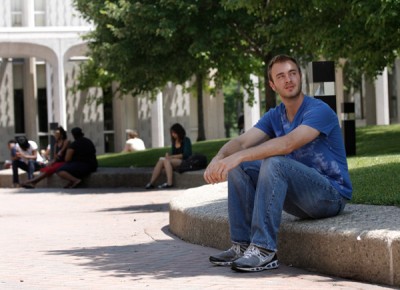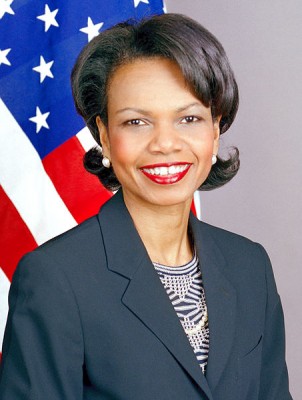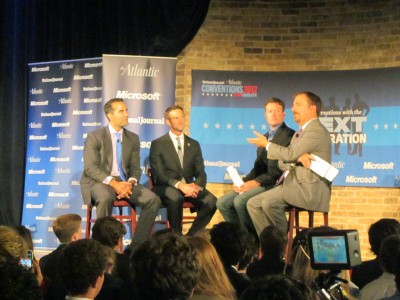From the convention: How can we fix higher education?
Charlie Nelms, former chancellor of North Carolina Central University, wants to send higher education faculty members back to school. Speaking at a panel during the Democratic National Convention in Charlotte, Nelms stressed the need for college and university professors to “teach people, not content.”

Jake Boyd, photographed on the campus of Macomb Community College in Warren, MI. Boyd took five years to finish a criminal-justice degree while working two jobs at the same time he was going to classes. (ROB WIDDIS/Special to MCT)
Nelms believes that faculty members who went through postsecondary education years or even decades ago are not equipped to teach today’s students. He and his fellow panelists also mentioned the need to retool work study programs so they become more relevant to students. Other suggestions included improving the use of technology in higher education and pushing remediation into high school – all to help more Americans get a degree.
The ideas were vetted during The College Advantage, a panel focusing on ways to improve higher education attainment for students, which happens to be President Barack Obama’s signature American Graduation Initiative.
Obama has called for 60 percent of Americans aged 25-34 to have a postsecondary degree of some kind by 2025. The Lumina Foundation, which hosted the panel, shares those goals, which so far appear to be falling short. (Disclosure: The Lumina Foundation is among The Hechinger Report’s many funders.)
For decades, those with only a high school diploma had ample opportunity to be a part of the middle class, explained Anthony Carnevale, director of the Georgetown University Center on Education and the Workforce. That opportunity started decreasing in the 80s, he said, and accelerated during the recent recession.
By far the most jobs lost in recent years were those requiring only a high school degree and no education requirements, according to recent research by Carnevale’s group. And unlike jobs requiring some college or a bachelor’s degree – which Carnevale said are growing again – jobs for those with only a high school degree continue to fall.
“They’re gone and not coming back,” Carnevale said. “To the extent that we keep looking for those jobs, we’re looking in the rearview mirror.”
And while college enrollment is up, it’s not going to stay that way, Carnevale said. “During the recession a lot of people ran into college,” he said. “It was a good place to hide.”
Enrollments are now dropping, with more schools having space available than at any time in at least a decade.
Panelists were clear that the main problem is not access to higher education but degree attainment, particularly for minority males.
Nelms thinks the issue should be tackled by black and Latino groups and leaders.
“If we wait for the white power structure… to initiate that conversation, it’s not going to happen,” he said.
Aaron Smith, executive director of Young Invincibles, a group that represents the voices of 18-34 year-olds in policy discussions, was also concerned about student loans policies and the possibility they may dissuade people from going to college. And Smith also wants to see more opportunities for education and the workforce to connect. He advocates sending college students to local companies and asking them for work study or internship opportunities.
American Chamber of Commerce Executive President Mick Fleming said the business community “has been slow to the table on higher education,” while very involved in the K-12 years.
“Everybody in the business community is saying what do we fix? The ‘what’ becomes the next step.”
Fleming had an answer. “[We need to] start to say this is what we need, and actually express it,” Fleming said.
From the convention: Bush tells Democrats to ‘choose’ between unions and kids
Education finally got its place in the spotlight Thursday during the final night of the Republican National Convention, although it wasn’t Mitt Romney who put it there. It was Former Florida Gov. Jeb Bush who delivered the GOP message, devoting his entire speech to improving education — his signature issue while in office and his top priority out of it.
Bush was joined by a teacher and a former Florida student to hammer his points home, and his speech represented the clearest attempt so far of Republicans to separate themselves on education policy from the Democrats – who Bush referred to as “masters of delay and deferral.”
Bush hit hard on the two areas where the two parties have the least common ground, school choice and relationship with unions. And he presented a black-and-white option:
“Choose,” he said. “You can either help the politically powerful unions. Or you can help the kids.”
Romney momentarily touched upon his school choice policies later in the night, during a nomination acceptance speech that focused more on his own background and Obama’s shortcomings.
It was Bush who did the heavy lifting to sell Romney’s education plan. But it wasn’t that long ago that he and President Obama were on the same side, though, says Valerie Strauss at The Answer Sheet.
“In March 2011, when Wisconsin teachers were battling with Gov. Scott Walker after he moved to strip them of most of their collective-bargaining rights, President Obama flew to Florida and shared a stage with Bush,” Strauss wrote. “Obama even called Bush a “champion of education reform.” Thursday night, of course, Bush slammed Obama in his speech, saying his policies have failed but never mentioning how much the two men have in common on school reform.”
On Thursday night, Bush argued that increasing school choice was a necessity to fix the country’s education system, even though teachers unions traditionally oppose charter schools and voucher programs. The Obama administration, which has thrown its support behind charters, has not pushed for vouchers.
“The sad truth is the equality of opportunity doesn’t exist in many of our schools. We give some kids a chance, but not all,” Bush said. “Let’s give every parent in America a choice about where their child attends school.”
Bush highlighted Frantz Placide, a Miami native and 2010 graduate of Wagner College,as a success story from Bush’s voucher program. Placide used his voucher to enroll in Miami – Archbishop Curley Notre Dame, a Catholic high school.
The voucher program was ruled unconstitutional in 2006, but Florida still has a tax credit scholarship program for low-income students. Vouchers will be on the ballot in Florida once more in November.
Romney has proposed a national system that would allow low-income and special needs students to be able to enroll in any school – public or private – with public funding. Bush praised his plan and sent another barb President Obama’s way.
“[Romney] believes parents – regardless of zip code or income – should be able to send their children to the school that fits them best,” Bush said. “That has set him against some entrenched interests. There are many people who say they support strong schools but draw the line at school choice.
“’Sorry, kid,’” Bush continued. “’Giving you equal opportunity would be too risky. And it will upset powerful political forces that we need to win elections.’”
His talk also simultaneously praised “great teachers” and implicitly criticized others.
Sean Duffy, a teacher at Texas’s Del Valle High School, spoke of “good teachers” leaving the profession for more money and “bad teachers” getting locked into the system, arguing that students should be put first.
“We need more great teachers like you,” Bush told him. “Teachers who don’t give up on a kid, who recognize that every child can learn and don’t waste a precious year of a student’s life.”
Bush acknowledged that teaching was a challenging job, but argued it boiled down to an easy formula. “If you follow some core principles, and you challenge the status quo, you get great results,” he said.
From the convention: college students talk youth vote, higher ed cost
Vice Presidential candidate Paul Ryan’s joke from his Wednesday night speech about how t his IPod playlist compared to presidential candidate Mitt Romney did not impress a group of journalism students from Lynn University in Boca Raton, Fla.
Five students from the school, where the third presidential debate will be held in October, have spent the week in Tampa covering higher education in the election, interviewing protesters and officials who are striving for their attention – and their votes.

Lynn University students Ricky Freebery, Tamara Reyes, A.J. Mercincavage, Sophia Barrett and Patricia Lammle have been covering higher education issues at the Republican National Convention. (Photo courtesy Andrew Vermes/Lynn University)
It’s clear they are missing the mark. The overall impression from these college students is that the Romney campaign is failing to connect with young voters and not talking enough about higher education.
“It’s obvious that they’re trying to get us involved,” graduate student Tammy Reyes said of Ryan’s iPod crack. “They’re not being very successful.”
Reyes, a foreign student from Nicaragua, believes lighthearted jokes about technology should be replaced with substance and discussions of issues that directly affect young voters – like college costs.
One major point of contention between Democrats and Republicans is how much government should subsidize tuition costs. The Republicans, for instance, have sought to cut funding to the Pell grant program, which provides funding for low-income students to pay for college, and tighten eligibility requirements for Pells.
The Republicans argue that increased government subsidies of higher education only serve to drive up tuition costs for all.
A.J. Mercincavage, an undergraduate Pell grant recipient himself, can understand some of their argument, but supports keeping the program intact.
“I think it’s really important for underprivileged students,” said Mercincavage, a senior at Lynn.
Overall, students found that education was not emerging as a hot button issue; They said the protesters they talked to were far more concerned with issues such as s Romney’s Mormonism.
The students also said that some education topics – – like special education or international student visas – were being ignored by Republicans and Democrats alike.
Patricia Lammle a student from Nicaragua studying for a master’s degree, was concerned about policies that made it hard to stay in America after coming here for school, and about a lack of action on President Obama’s part to make it any easier.
“I know Obama has said we should help the students who come here,” she said. “He just says the broad idea and then that’s it.”
From the convention: A Romney adviser on how he’d take on unions and school choice
Presidential candidate Mitt Romney has attempted to make his philosophy about how to improve American education widely known and easily accessible in recent weeks. But he hasn’t answered many specifics on the campaign trail. The Hechinger Report spoke with Jim Peyser, a member of Romney’s education team and a partner at the NewSchools Venture Fund, to find out more. Peyser also served as an adviser to Romney during his years as Massachusetts governor.
Here are some highlights of the conversation:
On what we could expect from the reauthorization of the Elementary and Secondary Education Act (ESEA) — which funds and defines the federal government’s role in the nation’s school — under Romney:
ESEA will likely be reauthorized under our next president. (Republicans and Democrats alike have criticized the current iteration of the law, the No Child Left Behind Act or NCLB.) Under a Romney administration, expect the focus to be “more about taking things out than putting things in,” Peyser said.
Romney has already said he would eliminate the No Child Left Behind requirement that core classes be taught by highly qualified teachers. This portion of the law defines a highly qualified teacher as one who has a degree in the subject area he or she teaches.
Peyser said a Romney administration would retain NCLB’s focus on assessments and accountability for schools and districts, but would likely minimize the consequences for schools that fail to meet standards.
“Those [consequences] have a minimal impact on what states and districts actually do. It ends up being more of a compliance exercise,” he said. “Those sorts of things would probably go away.”
Any bill produced would be consistent with Romney’s overall platform. “In general what he’d be looking to do is have a more narrowly focused federal education framework that is more targeted towards providing parents with greater choice,” Peyser said. “[It would be] less about micromanaging and establishing broad federal mandates.”
On how a Romney administration would take on teachers unions:
Although Republicans commonly criticize President Obama for not being tough enough on teachers unions, Peyser acknowledges that – especially with Romney’s goal of avoiding new mandates – a Romney administration would be limited in how it could enforce changes that some teachers unions balk at – such as new teacher evaluations or tenure reforms. Work rules for teachers are typically controlled at the state or local level.
That doesn’t mean there would be no role for Romney, though. “The federal government can do things that either reinforce or provide incentive one way or another,” said Peyser.
The highly qualified teacher provision of NCLB, for instance, reinforced a salary structure in which teachers are awarded pay bumps based on the number of years they teach and number of degrees they earn, rather than how well they perform in the classroom, he said. “It’s reinforcing the basic structures that are enshrined in collective bargaining agreements,” he said. “It’s things like that – being more sensitive to these federal mandates and the way they play out on the ground.”
Peyser also added that Romney would support the development of more charter schools, which often operate outside of union contracts, and that he would use the bully pulpit of the presidency to get his message across.
On school choice:
Increased school choice has become a signature issue for Romney – and the entire Republican Party. Romney’s white paper on education calls for putting more power in parents’ hands to choose schools for their children.
Yet, while parents care about academic quality, they might have a hard time evaluating it, Peyser said. An important component of expanded school choice would be having “information that is not only easier to get, but easier to understand,” he said.
“That’s only half of the equation,” Peyser said. “The other half is you have to have something to choose from.” Building up these quality options will take time. “It’s not a magic wand solution,” he said.
On how small “a heck of a lot smaller” U.S. Department of Education would be:
Romney told donors in April that he wouldn’t close the Department of Education. But he would consolidate it with another agency or make it “a heck of a lot smaller.”
Peyser said he didn’t know just how small we could expect the department to be under Romney but said it would certainly shrink substantially.
One likely target for cutting or elimination would be grant programs run through the federal government. Many were created decades ago and have narrow requirements and focuses, according to Peyser.
“There is a huge opportunity for both a lot of consolidation and elimination of those programs that should have a pretty significant impact on the scale of the federal Department of Education as well,” he said.
This story also appeared on NBCNews.com.
From the convention: Will private schools even take voucher students?
Expanding school choice is a central piece of Mitt Romney’s education platform. But allowing more public dollars to follow low-income and special-needs children to private schools — one of Romney’s main proposals for reforming American education– does not guarantee those schools will open their doors to them.
For example, a private school not far from the convention center — highlighted on the GOP Convention website as one of Florida’s best independent schools — did not take part in Florida’s first voucher program, which was ruled unconstitutional in 2006. And Tampa Preparatory School — founded in 1974 by a group of Tampa citizens, including Al Austin, chairman of the 2012 Tampa Bay Host Committee for the Republican convention — does not participate in the state’s current school choice programs.
Florida has a voucher program for special-education students and a tax credit scholarship program in which taxpayers are able to receive credits for donations made toward private school scholarships for low-income students.
As it turns out, many of Florida’s independent schools, which are a small subset of private schools that aim to be entirely independent from the government, do not take any form of public money on philosophical grounds.
“Vouchers have not impacted us significantly one way or the other,” said Barbara Hodges, executive director of the Florida Council of Independent Schools. The group accredits 159 independent schools across the state, including Tampa Prep. “It does not mean that we are supportive or non-supportive [of vouchers]. Part of being independent means that, typically, our schools do not take tax dollars.”
Tampa Prep, which serves grades six through 12, stresses student participation and the development of self-confidence. It’s open to students of all backgrounds, its website says. The middle school costs $18,375 a year, if paid in two installments in June and December, and the high school costs $19,025. The school supplies its own financial aid to help families unable to cover the full cost of tuition.
Robin Kennedy, the school’s Director of Alumni Relations and Communications, said in an email that the school had looked into vouchers, but so far has chosen not to participate.
Other Florida private schools say they would welcome an expanded voucher system. Many parochial schools around the country have struggled in recent years to stay afloat financially.
“[Romney’s plan] is definitely something we’d follow with interest,” said James Herzog, associate director of education for the Florida Conference of Catholic Bishops, which oversees the state’s Catholic schools. “We think it would make a big difference to our schools.
Although not all of Florida’s Catholic schools chose to take part in the state’s current school choice programs, the majority do, Herzog said, and the number grows each year.
“Most of the schools do say it’s a way to … make schools more accessible and affordable,” Herzog said. “We just wish there was more available for the middle class.”
From the convention: Condoleezza Rice talks educational ‘crisis’
Former Secretary of State Condoleezza Rice joined a long list of politicians—including both Mitt Romney and President Obama—describing education as the “civil rights issue of our day” in her speech at the Republican National Convention Wednesday night.
 “We need to give parents greater choice—particularly poor parents—whose kids, very often minorities, are trapped in failing neighborhood schools,” she said. “If we do anything else we condemn generations to joblessness and hopelessness.”
“We need to give parents greater choice—particularly poor parents—whose kids, very often minorities, are trapped in failing neighborhood schools,” she said. “If we do anything else we condemn generations to joblessness and hopelessness.”
Describing the “crisis in K-12 education” as a “threat to the very fabric of who we are,” Rice spoke of the need to get great teachers into schools as well as to expect more from students. “We need to have high standards for our kids because self-esteem comes from achievement and not lax standards and false praise,” she said.
Outside of Rice’s speech, education was mentioned only peripherally during a night focused again on America’s economy. When education did come up, most speakers addressed college—its rising costs and the job prospects for its graduates.
“College graduates should not have to live out their 20s in their childhood bedrooms, staring at their faded Obama posters,” Vice Presidential nominee Paul Ryan said.
He echoed earlier statements of Senate Republican Leader Mitch McConnell (R-Ky.) in describing the “recent college grad facing up to the painful reality that the only door open to her after four years of study and a pile of debt is her parents’.”
Michelle Voorheis, a family-business owner interviewed “backstage” at the convention, spoke of her financial worries, which were amplified by the fact that she just sent a son off to college.
Representative Cathy McMorris Rodgers (R-Wash.) also spoke personally. “I was the first in my family to graduate from college,” she said. “So I know how important that is to the American dream.”
From the convention: Local control versus national standards
One of the starkest differences between Republican and Democratic education platforms came to light in a series of panels that focused on two issues that presumably concern the millennial generation most: jobs and education.

From left to right: George P. Bush (Jeb Bush’s son), Representative Aaron Shock (R- Ill.), National Journal’s Jim Tankersley and NBC’s Chuck Todd – speaking at Conversations with the Next Generation. (Photo by Sarah Butrymowicz)
At “Conversations with the Next Generation,’’ Republican voices clamored for more local control of schools and less federal government mandates, while Democrats and former D.C. public schools Chancellor Michelle Rhee argued the opposite. The event was sponsored by The Atlantic and National Journal, and underwritten by Microsoft.
Rhee said it’s impossible to really know how students are doing, with each state having different standards and tests.
“We have to have – I think – national standards, a national assessment, so we can have an apples-to-apples comparison,” Rhee said.
But before Rhee spoke, Josh Romney, one of Republican nominee Mitt Romney’s five sons, promised his dad would give “as much power as he can back to the states” while George P. Bush, the son of former Florida Gov. Jeb Bush, noted that “education is best managed at the local level.”
Representative Aaron Shock (R- Ill.) also called for the federal government to stop increasing subsidies for higher education. He argued that when someone else is paying, people are less likely to notice the cost. Shock said increasing the amount of Pell grants could not solve skyrocketing college tuition.
The rest of the event underwritten by Microsoft, revolved around education topics that often receive bipartisan support. Bush even said that he thinks current Secretary of Education Arne Duncan should be able to keep his position – regardless of who wins in November.
Many panelists found common ground on the idea that teachers must be paid more in order to attract the top college students into the profession.
“High achieving young people do not want to go into a profession where … their value doesn’t count,” Rhee said. She also spoke of the need to change laws to open up the teaching profession to those who have not gone through a traditional teacher training program, but have other experiences.
At the secondary and post secondary level, speakers generally agreed that school needs to be more relevant to students — and that there needs to be a stronger connection between degrees awarded and workforce needs.
Part of the responsibility lies on universities to improve the advice they give students, Shock said.
“A lot of young people lack the appropriate amount of counseling at the four-year university level,” he said. “It’s not in [the university’s] interest to counsel young people on return of investment.’’
Shock did not offer an easy solution.
“I’m not saying there’s a silver bullet,” he said. “If this was simply a bill that needs to be passed or a law that needs to be written it would have been taken care of long ago.”
From the convention: GOP platform considers school choice a ‘consumer right’
The Republican Party voted on its official platform Tuesday, calling for more local control and less government spending in education. The platform is similar to Mitt Romney’s proposed education policies in many ways, including a plan for federal money to follow low-income and special-needs students to the school – public or private – that they choose to attend.
The platform frames the school choice issue as one of “consumer rights in education.” It supports options such as home schooling, virtual schools and vouchers. The document also singles out career and technical education programs as a way to “retrain and retool the American workforce.”
Republican support for more school choice extends to higher education. They have advocated for the expansion of private training schools, online universities and work-based learning in the private sector.
The platform includes a call for abstinence-only sex education, support of English-only education and a jab at unions. “We support putting the needs of students before the special interests of unions,” the document says. (Two paragraphs later, however, the document says America’s teachers “should be protected against frivolous litigation,” a statement the unions would likely argue is among their top priorities.) Republicans also voted to support “programs that support the development of character and financial literacy” and “an accurate account of American history that celebrates the birth of this great nation.”
Although the platform does not include many specifics, it does claim “we know what works.” Among the ideas that Republicans say have been proven to make a difference in education are also Democratic talking points, including accountability for administrators and teachers, transparency about school performance and merit pay.
Claims about education reforms supported by both party have not always been supported by research, however: For example, the practice of basing a teacher’s bonus or salary on how well their students perform has yet to show any effect on student achievement.
From the convention: Education and the first night’s speakers
The theme Tuesday night for the Republican National Convention was “We Built It,” and speakers stuck to a script focused on jobs, the economy and the importance of small business—with very little mention of education. When the topic was broached, it was to draw a clear line between Republicans and Democrats, who often share more common ground in education policy than in other issues.
Governor Chris Christie (R- N.J.) argued for a simple distinction between the parties in his highly anticipated keynote address
“They believe in teachers’ unions. We believe in teachers,” said Christie, echoing a common critique of the Obama administration made even by Republicans who agree with the basics of the President’s policies but maintain he has bowed to union pressure.
Christie touted his record of taking on teachers’ unions; he has had bitter feuds with them in New Jersey over tenure and education spending.
“We believe that the majority of teachers in America know our system must be reformed to put students first so that America can compete,” Christie said in his speech. “Teachers don’t teach to become rich or famous. They teach because they love children.”
Democrats, he said, “believe that the educational establishment will always put itself ahead of children.”
Sen. Rick Santorum (R-Pa.) also addressed education directly, saying it should be “the second rung on the ladder to success,” following stable marriages and families.
“President Obama’s solution has been to deny parents’ choice, attack private schools, and nationalize curriculum and student loans,” Santorum said. “Mitt Romney believes that parents and the local community must be in charge—not the Department of Education.”
Although Obama has been criticized by Republicans for not refinancing the Washington, D.C., voucher scholarship program, he has been a staunch supporter of charter schools. In his signature Race to the Top initiative, states were rewarded for raising charter school caps.
Obama is also often accused of being responsible for the Common Core State Standards, which lay out K-12 standards in English and Math; 48 states and the District of Columbia have adopted them. Although Obama’s administration supported the Common Core, in part through Race to the Top, the standards were developed by a nongovernmental group.
When Romney’s wife, Ann, touched on education in her speech, she had this to add: “Under Mitt, Massachusetts schools were the best in the nation. The best.”
From the convention: Education reform will require ‘getting ready for a fight’
Former D.C. Schools Chancellor Michelle Rhee called for classroom teachers unhappy with the system to brace themselves for battle. She spoke during a panel following the showing of “Won’t Back Down,” a film to be released this fall about a parent and teacher fighting to take over a failing school.
“There is a difference in my mind between teacher union leadership and rank-and-file teachers,” she said, adding that most teachers got into the profession wanting to have a positive impact. Fixing problems, she said, is “going to require teachers steeling themselves up and getting ready for a fight.”
“Won’t Back Down” features Maggie Gyllenhaal as the parent of a dyslexic daughter with a clearly incompetent teacher, and Viola Davis as a teacher who is convinced to try to shake up the system. Together, they work to get 50 percent of parents and teachers on their side to take advantage of a “fail-safe” trigger law that allows parents to take over a failing school. Along the way they battle the teachers’ union and school-board bureaucracy.
The film was shown at an event sponsored by Rhee’s advocacy organization, StudentsFirst, and the Foundation for Excellence in Education, a group founded by former Florida Gov. Jeb Bush.
“Won’t Back Down” has already been criticized for ignoring realities of the education system and overinflating the efficacy of parent trigger laws. These laws, which in theory allow a school takeover if 50 percent of parents sign a petition demanding so, have yet to be successfully implemented. In the past two years, such laws have been passed in seven states. Despite some attempts, no school has undergone a takeover as a result.
Given that, critics of the film question the claim that it was inspired by true events. But in the panel discussion director Daniel Barnz didn’t pretend it was based on a true story. “We tried to channel a fundamental truth about parents who can’t wait,” Barnz said, adding that he drew upon newspaper articles and other stories in crafting the film, which he described as a “utopia.”
“I’m a sucker for David-and-Goliath stories,” Barnz said. “What I really wanted to emphasize in the film is how people can work together.”
There is room in parent trigger laws for people to do just that, said Bush, one of the panelists discussing the film. “This is the one little Switzerland where the left and the right can agree,” he said.
But the parent trigger law doesn’t do enough, Bush said. He called for greater increases in school choice across the board, which is part of Romney’s education policy.
Rhee said she was unhappy that, despite both candidates taking clear stances on many education issues, the topic largely has been untouched on the campaign trail. “We are not talking about this issue nearly enough in this presidential election,” Rhee said. “I would hope we try to force the issue more.”







